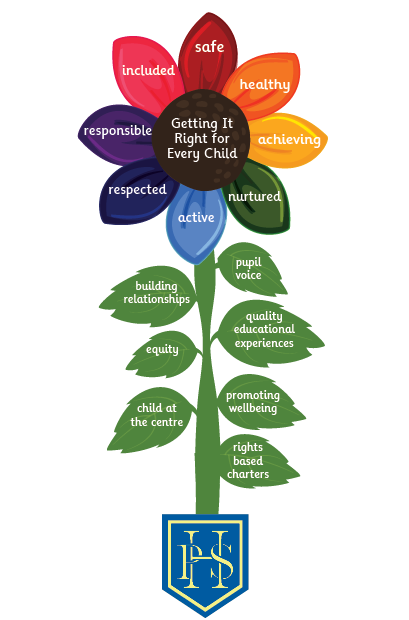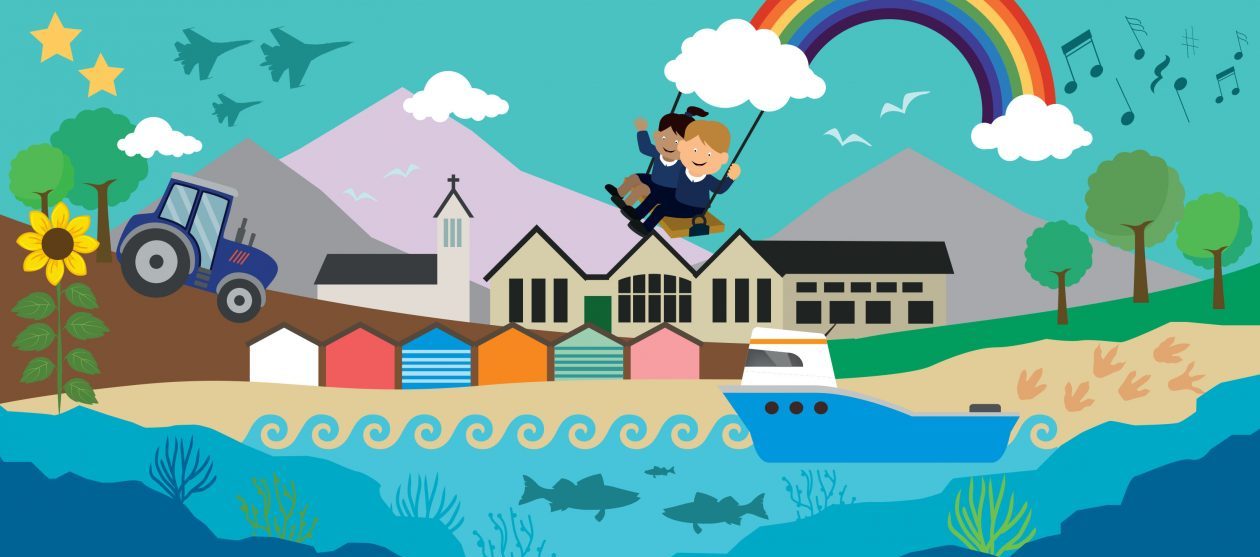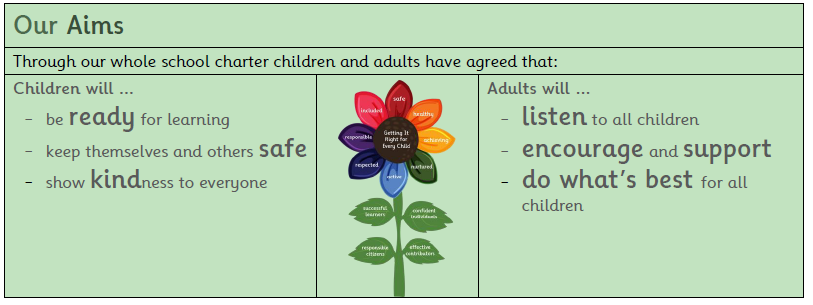The Hopeman Primary Experience
Our Vision
Our vision is encapsulated by our motto T.E.A.M Together Everyone Achieves More. Our vision at Hopeman Primary school is to use our unique village location, strong community links and high quality learning experiences to deliver a curriculum that enables our children to achieve excellence in the four capacities:
We want every child to play and learn in an environment where positive relationships are fostered and they feel Safe Healthy Achieving Nurtured Active Respected Responsible Included |
Our Values
Upon visiting Hopeman Primary School you notice the following values embedded in our ethos… Teamwork– we work in pairs, groups and across stages developing collaborative skills building a whole school community. We work closely with parents, the community and outside partners. |
| Our Aims
|
Developing Capacity in our Children
All children develop the knowledge, skills and attributes of Successful Learners, Confident Individuals, Effective Contributors and Responsible Citizens through:
|
Our Environmental Context Our curriculum is influenced by: Our curriculum is influenced by:
|
Our Approaches to Learning Literacy, numeracy and health and wellbeing core to all learning experiences. Our whole school and community approach to Learning for Sustainability weaves together global citizenship, sustainable development education, outdoor learning and children’s rights to create coherent, rewarding and transformative learning experiences. Our teaching approaches are based upon current research and methodologies. Literacy, numeracy and health and wellbeing core to all learning experiences. Our whole school and community approach to Learning for Sustainability weaves together global citizenship, sustainable development education, outdoor learning and children’s rights to create coherent, rewarding and transformative learning experiences. Our teaching approaches are based upon current research and methodologies. |
Supporting all Children Our curriculum delivery is based on GIRFEC guidelines. The wellbeing indicators are used to ensure all children are Safe, Healthy, Active, Nurtured, Achieving, Respected, Responsible and Included. Needs are identified early using baseline assessments and teacher judgement. Learner Profiles and Strategies are used to ensure additional support needs are met. Support is provided to all children where required and learning is differentiated. |
| Contexts for Learning Our learning experiences are delivered through the 4 CONTEXTS: 
Curriculum Areas are planned for and taught discretely or through a context. Ethos and life of the school provides children from the earliest stages with opportunities to be leaders of change and action. Interdisciplinary Learning allows for curricular areas to be weaved together within a context. Opportunities for Personal Achievements are planned for and celebrated both in the classroom and beyond. |
| Pupil Participation
Children work with each other and their teachers to shape their learning experiences and are involved in:
|
Ensuring Quality Learning Experiences We ensure learning is effective in a number of ways:· We ensure learning is effective in a number of ways:·
|
| 7 Principles of Curriculum Design
We are engaging with and developing the use of the design principles in our planning. All of our topic plans and interdisciplinary learning consider:
|
Parental Engagement Our school has an open door policy. We encourage parental involvement in all aspects of school life. We communicate regularly with parents through learning journals, termly curricular updates on the school website and termly newsletters and reports. We share the children’s learning through parent assemblies, shared learning, family learning, visits for parents and parent/teacher interviews. We regularly gather parental views through the Parent Council, parent forums, surveys and questionnaires. We have many parents who help in school and support with trips out of school. Our school has an open door policy. We encourage parental involvement in all aspects of school life. We communicate regularly with parents through learning journals, termly curricular updates on the school website and termly newsletters and reports. We share the children’s learning through parent assemblies, shared learning, family learning, visits for parents and parent/teacher interviews. We regularly gather parental views through the Parent Council, parent forums, surveys and questionnaires. We have many parents who help in school and support with trips out of school. |
Raising Attainment At Hopeman we have high expectations of pupils and staff who provide high quality learning and teaching experiences. We value and make use of: At Hopeman we have high expectations of pupils and staff who provide high quality learning and teaching experiences. We value and make use of:
|
Developing Our Curriculum All teachers dedicate time to: All teachers dedicate time to:
|
Celebrating our Successes We have a range of methods to communicate our successes in school, with our families and the wider community: We have a range of methods to communicate our successes in school, with our families and the wider community:
|
Our Programmes of Learning All programmes of learning are designed and refreshed using the Experiences and Outcomes from the Curriculum for Excellence. Each is relevant to our context and take into account enterprise, citizenship, sustainable development, international education and creativity. Programmes of learning are continually evaluated, updated and improved in line with national policy. All programmes of learning are designed and refreshed using the Experiences and Outcomes from the Curriculum for Excellence. Each is relevant to our context and take into account enterprise, citizenship, sustainable development, international education and creativity. Programmes of learning are continually evaluated, updated and improved in line with national policy. |
Out Transitions Our ethos of mixed stage and whole school events facilitates smooth transitions between stages. Transitions between nursery and primary 1 and P7 to secondary are well established and provide a smooth transition for all our pupils. Enhanced transitions are provided for some children. Our ethos of mixed stage and whole school events facilitates smooth transitions between stages. Transitions between nursery and primary 1 and P7 to secondary are well established and provide a smooth transition for all our pupils. Enhanced transitions are provided for some children. |




